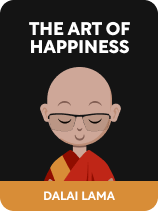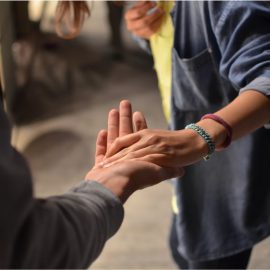

This article is an excerpt from the Shortform book guide to "The Art of Happiness" by Dalai Lama. Shortform has the world's best summaries and analyses of books you should be reading.
Like this article? Sign up for a free trial here .
What is the root cause of human unhappiness? Why do so many people feel unhappy despite having everything they need?
According to Dalai Lama, the root cause of human unhappiness stems from misunderstanding—many people don’t really understand where their emotions—both positive and negative—stem from. The solution, he counsels, is to educate yourself both about your emotions and the circumstances that give rise to them.
Here is what Dalai Lama has to say about the main reason for unhappiness and what to do about it.
How to Educate Yourself
By educating yourself, you root out the misunderstandings of the world that lead to negative emotions and therefore unhappiness. To understand the reason for your unhappiness, perform this educational self-analysis: think about when you’re happy and unhappy. Then, consider the feelings that led to your happiness or unhappiness. You’ll find that feelings like anger and hatred make you unhappy and hurt you and others, says the Dalai Lama. Because they’re hurtful, you’ll know these are negative emotions and that they’re based on a misunderstanding of the world.
Here’s an example of educating yourself on a negative emotion: You’re unhappy every time you see a particular friend. When you analyze this unhappiness, you realize it’s rooted in a feeling of resentment—they make more money than you. You further note this resentment is destroying your friendship with someone you otherwise like. Because of its destructiveness, you can determine that resentment is a negative emotion, based on the misconception that your friend is better off than you because they have more money.
| Education and Karma Buddhists refer to the state of being educated about yourself as “clear-knowing.” We can conceptualize this as “wisdom.” Wisdom has advantages beyond rooting out misunderstandings, negative emotions, and unhappiness: It prevents negative karma from being created. Karma is positive or negative energy that lives on your “resume of life.” If you intentionally do evil, you’ll have bad karma on your resume, which will negatively impact your future lives: Bad karma might cause you to be reborn as a non-human being, like an animal or ghost. Such creatures are less able than humans to work toward enlightenment, or Nirvana, and escape the cycle of rebirth. If you do good, though, you’ll have good karma on your resume, which will positively impact your future lives: You may be born as a human with a greater capacity to reach enlightenment than, say, a dog. When you’re wise, or clear-knowing, you’re more likely to make choices that build positive karma, thereby keeping your “resume of life” looking good. |
Conversely, feelings of compassion and generosity make you and others happy, says the Dalai Lama. Not only this, but they benefit you and others. These feelings, therefore, are positive.
Here’s an example of educating yourself on a positive emotion: You’re happy every time you see a neighbor. When you think about this happiness, you realize it’s rooted in a feeling of generosity, elicited because your neighbor often asks you for help with their groceries. You’ll further realize that your feeling of generosity benefits you and your neighbor by making you feel good and supporting your neighbor. Generosity, therefore, is a positive emotion.
(Shortform note: There’s scientific evidence to support the Dalai Lama’s belief that positive feelings are beneficial to you and others. Displaying kindness can lower stress hormone levels and increase your levels of “happiness” neurotransmitters, like serotonin and dopamine. Kindness toward others, in turn, spreads happiness to the recipients.)
Anger: Educate Yourself to Be Less Angry
Let’s look at how to educate yourself specifically on anger. According to the Dalai Lama, if you struggle with anger issues, educate yourself on the benefits of tolerance and patience and the destructive nature of anger. Negative emotions are rooted in a misunderstanding of the world and cause problems. Positive emotions, like tolerance and patience, are based in human nature and make you happy.
(Shortform note: You can educate yourself on the destructive effects of anger through self-analysis, but you can also turn to science to understand anger’s destructive nature: Suppressing anger can cause you to turn your anger on yourself and lead to chronic passive-aggressive behavior. Patience, on the other hand, has been scientifically proven to lessen the effects of depression.)
Anxiety: Educate Yourself to Be Less Anxious
If you struggle with anxiety, educate yourself about where the anxiety comes from and whether it’s valid, recommends the Dalai Lama. If, for instance, you’re anxious about going to an event, analyze your thoughts and figure out if you’re anxious for valid reasons—perhaps because you’re giving a speech—or because of a generalized fear of socializing.
(Shortform note: Figuring out the source of your anxiety can be difficult. If you’re not sure where your anxiety comes from, consider whether the following common anxiety triggers might be affecting you: 1) Work environment—is your job stressful? 2) Travel or commute—Do you spend a lot of time in transit? 3) Withdrawal—Are you withdrawing from alcohol, drugs, or medication?)

———End of Preview———
Like what you just read? Read the rest of the world's best book summary and analysis of Dalai Lama's "The Art of Happiness" at Shortform .
Here's what you'll find in our full The Art of Happiness summary :
- The Dalai Lama's Buddhist path toward happiness
- The use of scientific evidence to support the Dalai Lama's beliefs
- Concrete actions you can take to improve your outlook on life, relationships, and resilience






